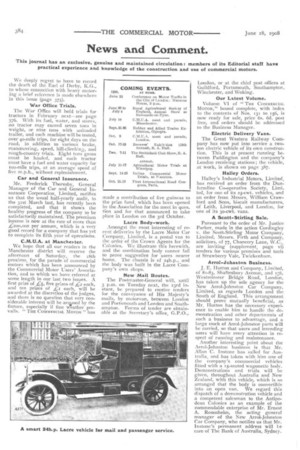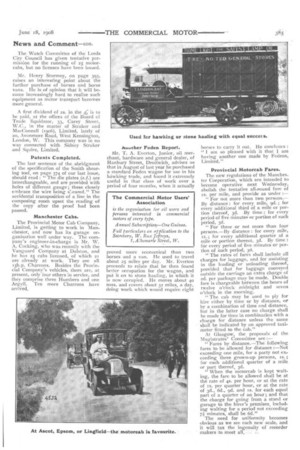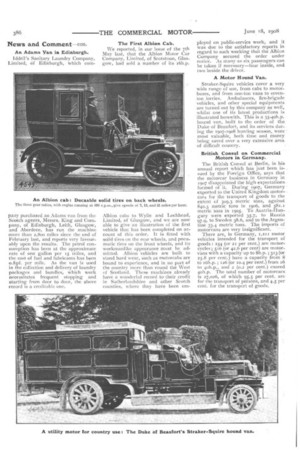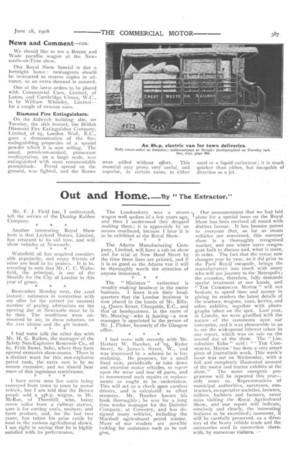News and Comment.
Page 10

Page 11

Page 12

Page 13

If you've noticed an error in this article please click here to report it so we can fix it.
This journal has an exclusive, genuine and maintained circulation: members of its Editorial staff have practical experience and knowledge of the construction and use of commercial motors.
We deeply regret to have to record the death of the Earl of Derby, K.G., to whose connection with heavy motoring a brief reference is made elsewhere in this issue (page 375).
War Office Trials.
The War Office will bold trials for tractors in February next—see page 376. With its fuel, water, and stores, no tractor may exceed seven tons in weight, or nine tons with unloaded trailer, and each machine will be tested, over go-mile trips, for eight days on the road, in addition to various brake, manoeuvring, speed, hill-climbing, and rough-country trials. Eight tons gross must be hauled, and each tractor must have a fuel and water capacity for zoo-mile trips, at an average speed of five m.p.h., without replenishment.
Car and General Insurance.
Mr. Frederick Moresby, General Manager of the Car and General Insurance Corporation, Limited, notifies us that the usual half-yearly audit, to the 31st March last, has recently been completed, and that it shows the healthy progress of the company to be satisfactorily maintained. The premium income is now at the rate of more than -L200,000 per annum, which is a very good record for a company that has yet to complete its fifth year of operations.
C.M.U.A. at Manchester.
We hope that all our readers in the Manchester district will reserve the afternoon of Saturday, the i8th proximo, for the parade of commercial motors which has been announced by the Commercial Motor Users' Association, and to which we have referred at some length in our last two issues. A first prize of £5, five prizes of Ja each, and ten prizes of Li each, will be awarded at the discretion of the judges, and there is no question that very considerable interest will be aroured by the fixture, especially if fine weather prevails. " THE COMMERCIAL MOTOR" has
made a contribution of five guineas to the prize fund, which has been opened by the .Association for the meet in ques_ tion and for that announced to take place in London on the 3rd October.
Lacre Body-work.
.Amongst the most interesting of recent deliveries by the Lacre Motor Car Company, Limited, is a postal van to the order of the Crown Agents for the Colonies. We illustrate this herewith, and the combination body cannot fail to prove suggestive for users nearer home. The chassis is of 24h.p., and the body was built in the Lacre Company's own shops.
New Mail Routes.
The Postmaster-General will, until 3 p.m. on Tuesday next, the 23rd instant, be prepared to receive tenders for the conveyance of His Majesty's mails, by motorvan, between London and Portsmouth and London and Southampton. Forms of tender are obtainable at the Secretary's office, G.P.O., London, or at the chief post offices at Guildford, Portsmouth, Southampton, Winchester, and Woking.
Our Latest Volume.
Volume VI of "THE COMMERCIAL MOTOR," bound complete, with index to the contents of Nos. 131 to 156, is now ready for sale, price 6s. 6d. post free, and orders should be addressed to the Business Manager.
Electric Delivery Vans.
The Great Western Railway Company has now put into service a twoton electric vehicle of its own construction. This is at present running between Paddington and the company's London receiving stations ; the vehicle, at work, is shown on page 387.
Halley Orders.
IIalley's Industrial Motors, Limited, has received an order from the Dunfermline Co-operative Society, Limited, for one of its 25-cwt. vehicles, and an order from Messrs. William Crawford and Sons, biscuit manufacturers, of Leith, Liverpool, and London, for one of its 30-cwt. vans.
A Scott-Stirling Sale.
Pursuant to the order of Mr. Justice Parker, made in the action Conlingley v. the Scott-Stirling Motor Company, Limited, Messrs. Firth and Company, solicitors, of 77, Chancery Lane, W.C., are inviting (supplement, page vi) tenders for various premises and tools at Strawberry Vale, Twickenham.
Arrol-Johnston Business.
J. E. IIutton and Company, Limited, of 81-83, Shaftesbury Avenue, and 1.0, Westminster Bridge Road, London, has taken up the sole agency for the New Arrol-Johnston Car Company, Limited, as regards London and the South of England. This arrangement should prove mutually beneficial, as Mr. Hutton has the necessary experience to enable him to handle the demonstration and other departments of such a business to advantage, and a large stock of Arrol-Johnston parts will be carried, so that users and intending users will have every attention in respect of running and maintenance.
Another interesting point about the Arrol-Johnston business is that Mr. Allan C. Instone has sailed for Australia, and has taken with him one of the cornpany's commercial vehicles fitted with a r5-seated wagonette body. Demonstrations and trials will be given, throughout Australia and New Zealand, with this vehicle, which is so arranged that the body is convertible into an open van. We regard this dispatch of a demonstration vehicle and a competent salesman to the Antipodean Colonies as an example of the commendable enterprise of Mr. Ernest A. Rosenheim, the acting general manager of the New Arrol-Johnston Car Company, who notifies us that Mr. Instone's permanent address will be care of The Bank of Australia, Sydney. The Watch Committee of the Leeds City Council has given tentative permission for the running of 25 motorcabs, but no licenses have been issued.
Mr. Henry Sturmey, on page 393, raises an interesting point about the further purchase of horses and horse Vans. He is of opinion that it will become increasingly hard to realise such equipment as motor transport becomes more general.
A first dividend of 25. in the is to be paid, at the offices of the Board of Trade liquidator, 33, Carey Street, W.C., in the matter of Straker and MacConnell (1906), Limited, lately of 20, Avonmore Road, West Kensington, London, W. This company was in no way connected with Sidney Straker and Squire, Limited.
Patents Completed.
The last sentence of the abridgment of the specification of the Smith shearing tool, on page 374 of our last issue, should read : ' The die plates (cf.) are interchangeable, and are provided with holes of different gauge ; these closely embrace the wire being s!:eared." The accidental transposition of a line in the composing room upset the reading of the copy after the proof had been passed.
Manchester Cabs,
The Provincial Motor Cab Company, Limited, is getting to work in Manchester, and now has its garage organisation well under way. The company's engineer-in-charge is Mr. W. A. Cocking, who was recently with the Vanguard Company at Dalston, and he as 25 cabs licensed, of which 21 are already at work. They are all ish.p. Charrons. Besides the Provincial Company's vehicles, there are, at present, only four others in service, and they comprise three Humbers and one Argyll. Ten more Charrons have arrived. Another Paden Report.
Mr. T. A. Everton, Junior, oil merchant, hardware and general dealer, of Hanbury Street, Droitwich, advises us that in August of last year he purchased a standard Foden wagon for use in his hiwking trade, and found it extremely useful in that class of work over a period of four months, when it actually
proved more economical than two horses and a van, He used to travel about 25 miles per day. Mr. Evertor] proceeds to relate that he then found better occupation for the wagon, and put it on to stone hauling, in which it is now occupied. He moves about 40 tons, and covers about 32 miles, a day, doing work which wouid require eight horses to carry it out. He concludes : "I am so pleased with it that I am having another one made by Fodens, Limited."
Provincial Motorcab Fares.
The new regulations of the Manchester Corporation, which are intended to become operative next Wednesday, abolish the tentative all-round fare of is. per mile, and provide as under For not more than two persons.— By distance : for every mile, 9d.; for every additional third of a mile or portion thereof, 3d. By time : for every period of five minutes or portion of such period, 3d. " For three or not more than four persons.—By distance : for every mile, If.; for every additional quarter of a mile or portion thereof, 3d. By time : for every period of five minutes or portion of such period, 3d. "The rates of fares shall include all charges for luggage, and for assisting in the loading or unloading thereof, provided that for luggage conveyed outside the carriage an extra charge of 2d. per package may be made. Double fare is chargeable between the hours of twelve o'clock midnight and seven o'clock in the morning.
"The cab may be used to ply for hire either by time or by distance, or by a combination of time and distance, but in the latter case no charge shall be made for time in combination with a charge for distance unless the same small be indicated by an approved taximeter fitted to the cab."
At Glasgow, the proposals of the Magistrates' Committee are :— "Fares by distance.—The following fares to be allowed for distance :—Not exceeding one mile, for a party not exceeding three grown-up persons, is. ; for each additional quarter of a mile or part thereof, 3d. " When the rnotorcab is kept waiting, the fare to be allowed shall be at the rate of 45. per hour, or at the rate of Is. per quarter hour, or at the rate of 3d., 6d., gd. and is. for each equal part of a quarter of an hour ; and that the charge for going from a stand or garage to the hirer's premises, including waiting for a period not exceeding 71 minutes, shall be 6d." The need for uniformity becomes obvious as we see each new scale, and it will tax the ingenuity of recorder makers to meet all. _. An Adams Van in Edinburgh.
Iddell's Sanitary Laundry Company, Limited, of Edinburgh, which corn
pally purchased an Adams van from the Scotch agents, Messrs. King and Company, of Edinburgh, Leith, Glasgow, and Aberdeen, has run the machine more than 2,800 miles since the end of February last, and reports very favourably upon the results. The petrol consumption has been at the approximate rate of one gallon per 15 miles, and the cost of fuel and lubricants has been o.85d. per mile. As the van is used in the collection and delivery of laundry packages and bundles, which work necessitates frequent stopping and starting from door to door, the above record is a creditable one.
The First Albion Cab.
We reported, in our issue of the 7th May last, that the Albion Motor Car Company, Limited, of Scotstoun, Glasgow, had sold a number of its t6h.p.
Albion cabs to Wylie and Lochhead, Limited, of Glasgow, and we are now able to give an illustration of the first vehicle that has been completed on ac7. count of this order. It is fitted with solid tires on the rear wheels, and pneumatic tires on the front wheels, and its workmanlike appearance must be ad: mitted. Albion vehicles are built to stand hard wear, such as motorcabs are bound to experience, and in no part of the country more than round the West of Scotland. These machines already have a wonderful record to their credit in Sutherlandshire and other Scotch counties, where they have been cm
ployed on public-service work, and it was due to the satisfactory reports in regard to such working that the Albion Company secured the order under notice. As many as six passengers can be taken if necessary—four inside, and two beside the driver.
A Motor Hound Van.
Straker-Squire vehicles cover a very wide range of use, from cabs to motorbuses, and from one-ton vans to seventon lorries. Ambulances, fire-brigade vehicles, and other special equipments are turned out by this company as well, whilst one of its latest productions is illustrated herewith. This is a 35-40h.p. hound van, built to the order of the Duke of Beaufort, and its services during the 1907-1908 hunting season, were most valuable, both time and money being saved over a very extensive area of difficult country.
British Consul on Commercial Motors in Germany.
The British Consul at Berlin, in his annual report which has just been issued by the Foreign Office, says that the motorcar business in Germany in 1907 disappointed the high expectations formed of it. During 1907, Germany exported to the United Kingdom motor-. cars for the transport of goods to the extent of 309.3 metric tons, against 840.3 metric tons in 1906, and 581.1 metric tons in 1905. To Austria-Hungary were exported 35.7, to Russia 97.9, to Sweden 38.6, and to the Argentine 33.4 metric tons. The imports of motorvans are very insignificant.
There are, in Germany, 1,211 motor vehicles intended for the transport of goods : 254 (or 21 per cent.) are motorcycles ; 516 (or 42.6 per cent) are motorvans with a capacity up to 8h.p. ; 313 (or 25.8 per cent.) have a capacity from 8 to 16h.p. ; 126 (or 10.4 per cent.) from 16 to 4oh.p., and 2 (0.2 per cent.) exceed 4oh.p. The total number of motorcars is 27,026, of which 95.5 per cent, are for the transport of persons, and 4.5 per cent, for the transport of goods.
We should like to see a Broom and Wade paraffin wagon at the Newcastle-on-Tyne show.
Our Royal Show Special is due a fortnight hence : newsagents should be instructed to reserve copies in ad. vance, as an extra demand is assured.
One of the latest orders to he placed with Commercial Cars, Limited, of Luton, and Cambridge Circus, W.C., is by William Whiteley, Limited— for a couple of two-ton vans.
Diamond Fire Extinguishers.
On the Aldwych building site, on Tuesday, the tfith instant, the British Diamond Fire Extinguisher Company, Limited, of 65, London Wall, E.C., gave a demonstration of the fireextinguishing properties of a special powder which it is now selling. The usual, petroleum-soaked, piano.case conflagration, on a large scale, was extinguished with most commendable promptitude. Petrol spread on the ground, was lighted, and the flames were stifled without effort. This material may prove very useful, and superior, in certain cases, to either sand or a liquid extincteur; it is much quicker than either, but incapable of direction as a jet.






















